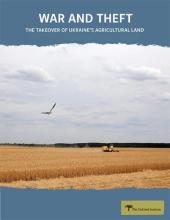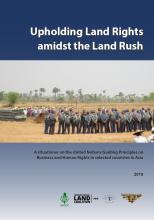Land Library Search
Through our robust search engine, you can search for any item of the over 73,000 highly curated resources in the Land Library.
If you would like to find an overview of what is possible, feel free to peruse the Search Guide.
/ library resources
Showing items 1 through 9 of 66.Green energy (and/or renewable energy) requires large areas of land to operate, often more so than energy generated from fossil fuels. The acquisition of land comes with accompanying corruption risks which can lead to challenges such as land grabbing and illegal displacement of communities.
Despite the existence of a legal framework defining the right to fair compensation, and notwithstanding the vast literature on transnational and domestic land deals, no theory has been developed so far to allow for a specific analysis of the economics of fair compensation in large-scale land acqu
War and Theft: The Takeover of Ukraine’s Agricultural Land, exposes the financial interests and the dynamics at play leading to further concentration of land and finance.
This publication discusses the relevance to land and agriculture of the United Nations Guiding Principles on Business and Human Rights (UNGP BHR), and provides an overview of the state of the UNGP BHR’s implementation in Bangladesh, Cambodia, India, Indonesia, Nepal, and the Philippines.
The International Land Coalition’s Commitment 8 seeks to ensure transparency and accountability, through unhindered and timely public access to all information that may contribute to info
Over the last decade, there have been considerable concerns raised regarding the social and environmental impacts of large-scale land concessions for plantation development in various parts of the world, especially in the tropics, including in Laos and Cambodia.
WEBSITE ABSTRACT: This case study presents a country-wide quantitative analysis of a Parliamentary Commission established in 2012 in Myanmar to examine ‘land grab’ cases considered and to propose solutions towards releasing the land to its original owners, in most cases smallholder farming famili
Since small-scale farmers manage most of the cultivated land worldwide, the ongoing shift in systems of production associated with large-scale land acquisitions (LSLAs) may dramatically reshape the world's agrarian landscape, significantly impacting rural populations and their livelihoods.
ABSTRACTED FROM CHAPTER INTRODUCTION: The preceding chapters of this book give a central place to the Powers of Exclusion framework for understanding transformations in land relations, as developed in our 2011 book on Southeast Asia.






